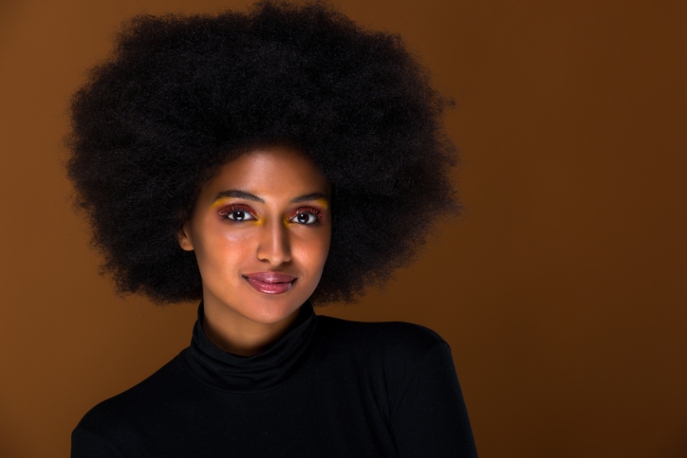Photo Credit: Diamond Dogs
When people think of sexual harassment, the first association they may have is a persistent physical or verbal focus on parts of the body we perceive as overtly sexual like the chest, butt, or genital area. Yet, continued sexual predation does not always start out with behaviors so blatant. Sometimes, harassers will “start small” to test the waters. These misbehaviors could range from lingering too long in a hug to rubbing someone’s shoulders, stroking an arm, unexpectedly whispering in someone’s ear, prolonged staring, and yes, touching someone’s hair. Regardless of the perpetrators intent, these actions cause discomfort. Furthermore, these actions can be done with the intent of subtly expressing control to the victim to pave the way for worse behavior. What’s so insidious about these types of behaviors is that they can be minimized by the perpetrator, human resources departments often don’t know how to proceed with these kinds of complaints, and victims are left feeling gaslit about these behaviors and question whether they’re “overreacting.” In this week’s blog, we examine how unwanted hair touching is discriminatory and a form of sexual harassment.
Hair has a long history of sexualization. While hair may not be immediately perceived by the general public as sexual, cultural cues suggest otherwise. We use the term “grooming” to describe a pattern of behaviors that ingratiate sexual predators towards their victims, particularly minors. Some hold strong opinions about the length of hair associated with femininity and masculinity, which can lead to discrimination and harassment for people that make choices outside this binary. TikTok users from the server industry found that wearing pigtails got them extra tips from men, opening up discussion about how infantilization and sexualization are intertwined issues.
Additionally, the cultural narrative around hair isn’t just sexualized, it’s racialized too. For people with non-white hair textures, particularly Black women, physical and verbal harassment surrounding their hair has a legacy of sexual and racial undertones. In a study by the Trades Union Congress about the sexual and racial harassment Black employees receive at work, respondents cited the unwanted touching of their hair in their experiences. One participant noted that this hyper-fixation and control placed on all parts of a Black woman’s body speaks to, “the ‘exoticisation’ of Black women has deep historical roots that render them more vulnerable to sexual harassment as well as to racialised forms of sexual harassment that cannot be disentangled from racism.”
When discussing intimate contact with hair as a form of sexual harassment, this is not an infrequent, abstract issue. This form of harassment is too infrequently recognized within workplaces and related environments. Earlier this year, one middle school teacher didn’t face reprimand for her frequent hair touching, non-consensual hand-holding, and comments about her male student until after she forcibly straightened his hair. In 2023, one UK writer recalled how a colleague stroked her hair daily and, while uncomfortable, didn’t come forward because she hadn’t put together that this misbehavior could fall under sexual harassment. Even President Joe Biden has had to answer for sniffing and kissing a colleague’s hair at a campaign rally in 2014. The pervasiveness of this issue shows that there’s still so much work around public awareness that we must do.
The good news is that there is already important work in this area that’s been put into motion. The CROWN (Creating a Respectful and Open World for Natural Hair) Act, which protects people with naturally textured hair from discrimination and harassment in workplaces and schools, has passed in 24 states and there are efforts to bring it to the federal level. While legislation can be part of the solution, an employee’s right to not endure hair-based sexual and racial harassment should not be recognized by companies only due to legal obligations presented by their state. No matter where a company is based, they should work to create unwavering policy that unequivocally supports all their employees’ sense of dignity, safety, and respect.
RALIANCE is proud of the work that we’ve done in our creation of the RALIANCE Taxonomy, which helps organizations categorize and process problematic and/or harmful workplace sexual misconduct. Hair-based sexual harassment is a part of our categorization. We would be more than happy to collaborate with any organizations that are interested in reshaping their policies to better tackle hair-based sexual harassment, micro-aggressions, and other forms of sexual misconduct.
Everyone deserves to wear their hair naturally, not be made to feel uncomfortable, and to be perceived and treated at work with dignity and professionalism. We hope to see more businesses grow in their commitment to recognizing non-consensual hair touching as sexual harassment, validate victim experiences, investigate and process all claims accordingly, and evolve into settings that make everyone feel safe and respected.
RALIANCE is a trusted adviser for organizations committed to building cultures that are safe, equitable, and respectful. RALIANCE offers unparalleled expertise in serving survivors of sexual harassment, misconduct, and abuse which drives our mission to help organizations across sectors create inclusive environments for all. For more information, please visit www.RALIANCE.org.

